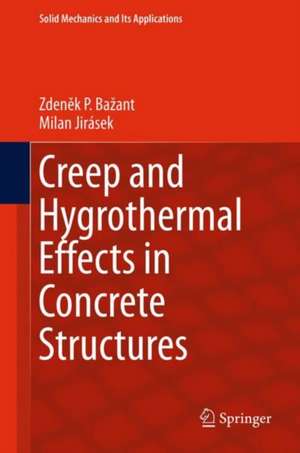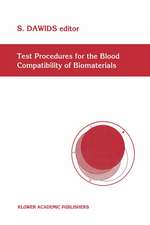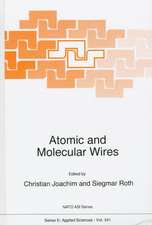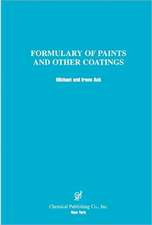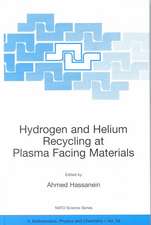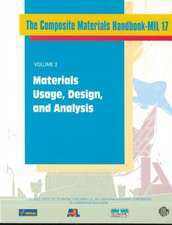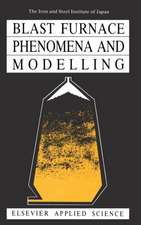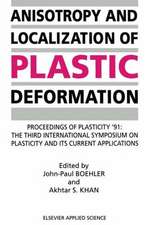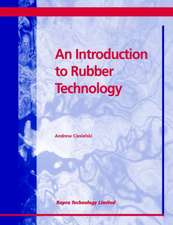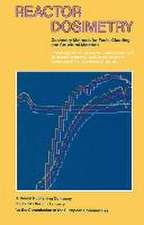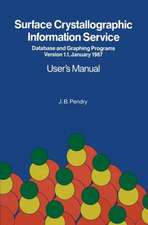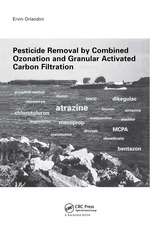Creep and Hygrothermal Effects in Concrete Structures: Solid Mechanics and Its Applications, cartea 225
Autor Zdeněk P. Bažant, Milan Jiráseken Limba Engleză Hardback – feb 2018
All the results are derived mathematically and justified as much as possible by extensive test data. The theoretical background in linear viscoelasticity with aging is covered in detail. The didactic style makes the book suitable as a textbook. Everything is properly explained, step by step, with a wealth of application examples as well as simple illustrations of the basic phenomena which could alternate as homeworks or exams.
The book is of interest to practicing engineers, researchers, educators and graduate students.
| Toate formatele și edițiile | Preț | Express |
|---|---|---|
| Paperback (1) | 616.99 lei 6-8 săpt. | |
| SPRINGER NETHERLANDS – 7 iun 2019 | 616.99 lei 6-8 săpt. | |
| Hardback (1) | 819.65 lei 6-8 săpt. | |
| SPRINGER NETHERLANDS – feb 2018 | 819.65 lei 6-8 săpt. |
Din seria Solid Mechanics and Its Applications
- 20%
 Preț: 698.09 lei
Preț: 698.09 lei - 24%
 Preț: 800.14 lei
Preț: 800.14 lei - 15%
 Preț: 640.06 lei
Preț: 640.06 lei - 15%
 Preț: 653.14 lei
Preț: 653.14 lei - 18%
 Preț: 1124.92 lei
Preț: 1124.92 lei - 15%
 Preț: 643.84 lei
Preț: 643.84 lei - 18%
 Preț: 1119.38 lei
Preț: 1119.38 lei - 20%
 Preț: 573.17 lei
Preț: 573.17 lei - 18%
 Preț: 1607.92 lei
Preț: 1607.92 lei - 17%
 Preț: 393.72 lei
Preț: 393.72 lei - 17%
 Preț: 459.40 lei
Preț: 459.40 lei - 18%
 Preț: 959.98 lei
Preț: 959.98 lei - 18%
 Preț: 747.71 lei
Preț: 747.71 lei -
 Preț: 388.55 lei
Preț: 388.55 lei - 18%
 Preț: 787.15 lei
Preț: 787.15 lei -
 Preț: 406.25 lei
Preț: 406.25 lei - 15%
 Preț: 639.08 lei
Preț: 639.08 lei - 24%
 Preț: 784.82 lei
Preț: 784.82 lei - 15%
 Preț: 643.34 lei
Preț: 643.34 lei - 18%
 Preț: 958.07 lei
Preț: 958.07 lei - 18%
 Preț: 1228.15 lei
Preț: 1228.15 lei - 18%
 Preț: 734.27 lei
Preț: 734.27 lei - 18%
 Preț: 1233.06 lei
Preț: 1233.06 lei - 18%
 Preț: 1236.19 lei
Preț: 1236.19 lei - 18%
 Preț: 950.96 lei
Preț: 950.96 lei - 18%
 Preț: 906.48 lei
Preț: 906.48 lei - 18%
 Preț: 964.54 lei
Preț: 964.54 lei - 20%
 Preț: 995.75 lei
Preț: 995.75 lei - 18%
 Preț: 953.65 lei
Preț: 953.65 lei - 18%
 Preț: 1239.67 lei
Preț: 1239.67 lei - 18%
 Preț: 962.35 lei
Preț: 962.35 lei - 18%
 Preț: 964.54 lei
Preț: 964.54 lei - 18%
 Preț: 913.11 lei
Preț: 913.11 lei - 18%
 Preț: 1226.90 lei
Preț: 1226.90 lei - 18%
 Preț: 945.47 lei
Preț: 945.47 lei
Preț: 819.65 lei
Preț vechi: 999.58 lei
-18% Nou
Puncte Express: 1229
Preț estimativ în valută:
156.86€ • 162.04$ • 130.55£
156.86€ • 162.04$ • 130.55£
Carte tipărită la comandă
Livrare economică 25 martie-08 aprilie
Preluare comenzi: 021 569.72.76
Specificații
ISBN-13: 9789402411362
ISBN-10: 9402411364
Pagini: 925
Ilustrații: L, 918 p. 335 illus., 10 illus. in color.
Dimensiuni: 155 x 235 x 59 mm
Greutate: 1.52 kg
Ediția:1st ed. 2018
Editura: SPRINGER NETHERLANDS
Colecția Springer
Seria Solid Mechanics and Its Applications
Locul publicării:Dordrecht, Netherlands
ISBN-10: 9402411364
Pagini: 925
Ilustrații: L, 918 p. 335 illus., 10 illus. in color.
Dimensiuni: 155 x 235 x 59 mm
Greutate: 1.52 kg
Ediția:1st ed. 2018
Editura: SPRINGER NETHERLANDS
Colecția Springer
Seria Solid Mechanics and Its Applications
Locul publicării:Dordrecht, Netherlands
Cuprins
Part I Fundamentals.- 1 Introduction.- 2 Fundamentals of Linear Viscoelasticity.- 3 Basic Properties of Concrete Creep, Shrinkage and Drying.- 4 Structural Effects of Creep and AAEM.- 5 Numerical Analysis of Creep Problems.- 6 Uncertainty Due to Parameter Randomness.- 7 Paradigms of Application, Phenomena Affecting Creep.- Part II Advanced Topics.- 8 Moisture Transport in Concrete.- 9 Solidification Theory.- 10 Microprestress-Solidification Theory.- 11 Physical and Statistical Justifications of Models B3 and B4.- 12 Cracking and Fracture Mechanics Aspects.- 13 Temperature Effect.- A Viscoelastic Rheologic Models.- B Historical Note on Old Creep Models.- C Estimates of Parameters Used By RILEM Model B3.- D Estimates of Parameters Used By RILEM Model B4.- ECreep Models Recommended by Design Codes.- F Continuous Retardation Spectrum.- G Updating Long-Time Shrinkage Predictions.- H Transport Properties.- I Moisture Transport in Porous Materials.- J Nonstandard Statistics.- K Potentials for Aging Viscoelasticity.- L Method of Measurement of Creep and Shrinkage.
Notă biografică
Zdeněk Bažant. Born and educated in Prague (Ph.D. 1963), Zdeněk Bažant joined Northwestern in 1969, where he has been W.P. Murphy Professor since 1990 and simultaneously McCormick Institute Professor since 2002, as well as Director of Center for Geomaterials (1981–87). He was inducted to NAS, NAE, American Academy of Arts & Sciences, Royal Society London; to the academies of Italy (Lincei), Austria, Spain, Czech Republic, Greece (Athens) and Lombardy; and to Academia Europaea and European Academy of Sciences & Arts. He is an honorary member of ASCE, ASME, ACI, and RILEM; received seven honorary doctorates as well as the von Karman, Timoshenko, Prager and Newmark medals among many others; was awarded the Austrian Cross for Science and Art 1st Class from President of Austria; was President of SES, founding President of IA-FraMCoS and IA-ConCreep, and Editor-in-Chief of ASCE Journal of Engineering Mechanics. He has previously authored
7 books and over 600 papers. In 2015, ASCE established Z.P. Bažant Medal for Failure and Damage Prevention, and Z.P. Bažant Prize for Engineering Mechanics was created in Czech Republic. He is one of the original top 100 ISI Highly Cited Scientists in Engineering (www.ISIhighlycited.com).Milan Jirásek graduated from the Czech Technical University in Prague in 1985 and received his Ph.D. from Northwestern University in 1993. From 1994 to 2004 he was a researcher at the Swiss Federal Institute of Technology in Lausanne. Since 2004 he has been a professor at the Faculty of Civil Engineering, Czech Technical University in Prague. His research focuses on mathematical modeling and numerical simulations of deformation and failure of materials and structures, based on the theories of viscoelasticity, plasticity, fracture and damage mechanics. He has co-authored one book (Inelastic Analysis of Structures) and more than 60 journal papers,and he
has co-organized a series of international conferences (CFRAC - Computational Modeling of Fracture and Failure of Materials and Structures).
7 books and over 600 papers. In 2015, ASCE established Z.P. Bažant Medal for Failure and Damage Prevention, and Z.P. Bažant Prize for Engineering Mechanics was created in Czech Republic. He is one of the original top 100 ISI Highly Cited Scientists in Engineering (www.ISIhighlycited.com).Milan Jirásek graduated from the Czech Technical University in Prague in 1985 and received his Ph.D. from Northwestern University in 1993. From 1994 to 2004 he was a researcher at the Swiss Federal Institute of Technology in Lausanne. Since 2004 he has been a professor at the Faculty of Civil Engineering, Czech Technical University in Prague. His research focuses on mathematical modeling and numerical simulations of deformation and failure of materials and structures, based on the theories of viscoelasticity, plasticity, fracture and damage mechanics. He has co-authored one book (Inelastic Analysis of Structures) and more than 60 journal papers,and he
has co-organized a series of international conferences (CFRAC - Computational Modeling of Fracture and Failure of Materials and Structures).
Textul de pe ultima copertă
This comprehensive treatise covers in detail practical methods of analysis as well as advanced mathematical models for structures highly sensitive to creep and shrinkage. Effective computational algorithms for century-long creep effects in structures, moisture diffusion and high temperature effects are presented. The main design codes and recommendations (including RILEM B3 and B4) are critically compared. Statistical uncertainty of century-long predictions is analyzed and its reduction by extrapolation is discussed, with emphasis on updating based on short-time tests and on long-term measurements on existing structures. Testing methods and the statistics of large randomly collected databases are critically appraised and improvements of predictions of multi-decade relaxation of prestressing steel, cyclic creep in bridges, cracking damage, etc., are demonstrated. Important research directions, such as nanomechanical and probabilistic modeling, are identified, and the need for separating the long-lasting autogenous shrinkage of modern concretes from the creep and drying shrinkage data and introducing it into practical prediction models is emphasized.
All the results are derived mathematically and justified as much as possible by extensive test data. The theoretical background in linear viscoelasticity with aging is covered in detail. The didactic style makes the book suitable as a textbook. Everything is properly explained, step by step, with a wealth of application examples as well as simple illustrations of the basic phenomena which could alternate as homeworks or exams.
The book is of interest to practicing engineers, researchers, educators and graduate students.
All the results are derived mathematically and justified as much as possible by extensive test data. The theoretical background in linear viscoelasticity with aging is covered in detail. The didactic style makes the book suitable as a textbook. Everything is properly explained, step by step, with a wealth of application examples as well as simple illustrations of the basic phenomena which could alternate as homeworks or exams.
The book is of interest to practicing engineers, researchers, educators and graduate students.
Caracteristici
Winner of a 2019 Most Promising New Textbook Award Based on current level of theoretical development Clear separation, in Parts I and II, of the minimalistic simple approach for practicing engineers from a more realistic but more sophisticated approach for researchers and analysts of special structures Multiscale relation of macroscopic models to nano-scale materials science, thermodynamics of water adsorption, and diffusion processes Includes probabilistic aspects, statistical data evaluation, and statistical prediction, required to counter high scatter in structural response Includes case studies, such as the excessive deflections of collapsed world-record bridge in Palau
